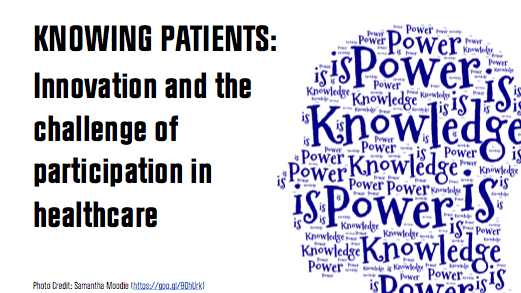Knowing Patients: Innovation and the challenge of participation in healthcare
Tuesday, May 9, 2017 - 13:00 to 17:30

The workshop topic of Knowing Patients is advanced to inspire reflections on the two meanings of the term: the emergence of patients as having important knowledge about policy, innovation, and care delivery; and the organizational challenges of making their views not just known but translated into innovation and care. This workshop gathers a range of interdisciplinary scholars, as well as practitioners, from the UK and Denmark, who are all at the forefront in seeking to address these challenges, in order for the practice of patient engagement for the purpose of innovation to be advanced.
Rationale
“Putting patients first” has become a mantra within healthcare policy-making, innovation, and delivery and has also been shown to be central to quality and patient safety, over the past twenty years. The rhetoric of patient “participation”, “empowerment”, “engagement”, etc., however, has outpaced the reality of how policies are formulated, innovations are conceived, and care is delivered. As a report by the UK’s King’s Fund, a think tank, summarizes, “the evidence is clear: overall, people are not as involved as they want to be in decisions about health and care, yet when they are involved, decisions are better, health and health outcomes improve, and resources are allocated more effectively” (2014: 6).
This workshop is intended to address the central organizational challenges underpinning this situation: those, firstly, of making potentially diverse patient views knowable and amenable to action, and then, secondly, of translating them into healthcare policy, delivery, and innovation. Both activities have proven problematic. Research shows that there are fundamental questions over the kinds of knowledge which patients can provide (Pols, 2016), the role of traditional methods such as surveys to make those views known (Pflueger, 2016), and the capabilities of patient data within specific organizational settings (Robert et al, 2015). Changing customers role in service delivery remains an important way of innovating service supply chains (Sampson and Spring, 2013). However, research also demonstrates that additional diversity in the needs and views of the patient increases complexity for care innovation and delivery. Modular care provision is suggested as a principle for managing this complexity while enabling customization to the needs of individual, but it has also highlighted the new challenge of managing different interfaces in service provision (de Blok et al., 2010; 2014).
Program
Tuesday 9 May 2017
13.00 – 13.15: Welcome and introduction (Professor Finn Valentin, Study Director of MSc Innovation In Health Care, Thomas Frandsen, Department of Operations Management, CBS)
13.15 – 13:45: Dane Pflueger, Department of Operations Management, CBS
13:45 – 14:15: Dr James Munro, CEO of Patient Opinion
14:15 – 14:30: Break
14:30 – 15:00: Professor Glenn Robert, Chair in Healthcare Quality and Improvement, Kings College London
15:00 – 15:30: Katrine Kirk, Healthcare Management Consultant, Par3
15:30 – 15:45: Break
15:45 – 16:15: Professor Martin Spring, Lancaster University Management School
16:15 – 16:45: Ralph Nedergaard, Senior Partner, INVIXO Consulting Group A/S
16:45 – 17:30: Roundtable wrap-up (facilitated by Professor Jan Mouritsen, Department of Operations Management, CBS)
Location
Copenhagen Business School
Dalgas Have 15
2000 Frederiksberg
Room: D1Ø089
RSVP
Participation is free, but for practical reasons, please RSVP to cmp.om@cbs.dk no later than 5 May.
The page was last edited by: Department of Operations Management // 10/20/2021